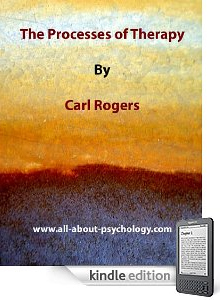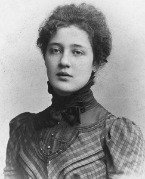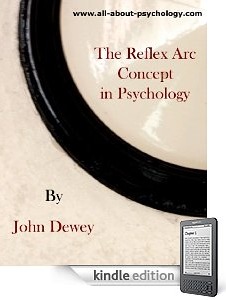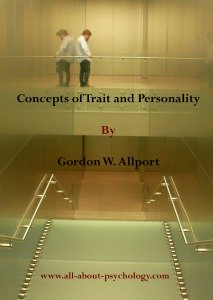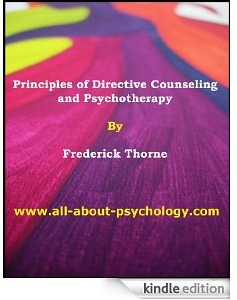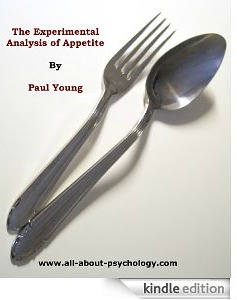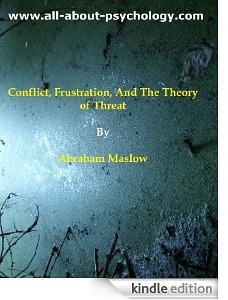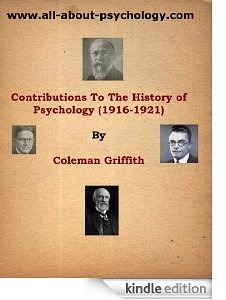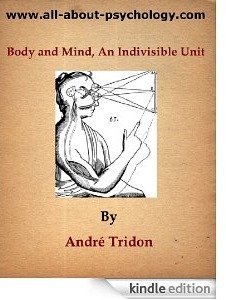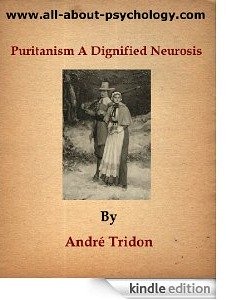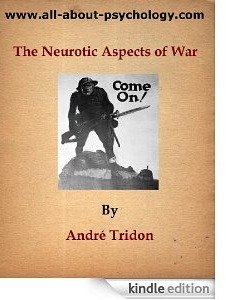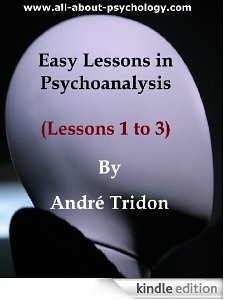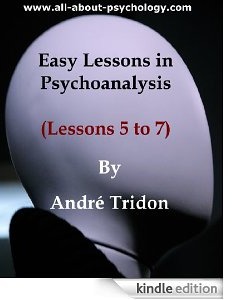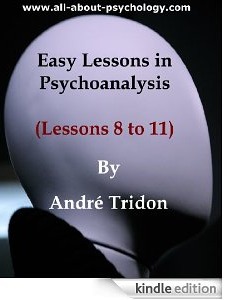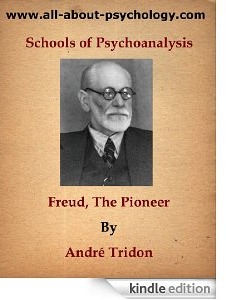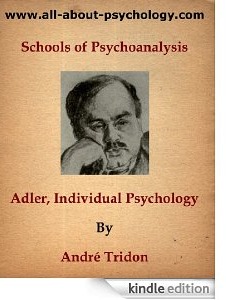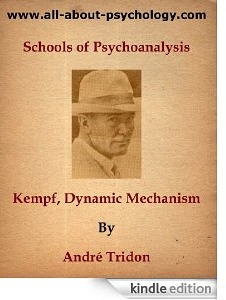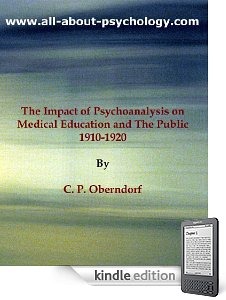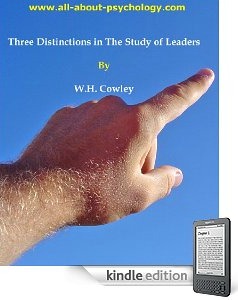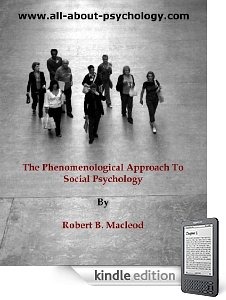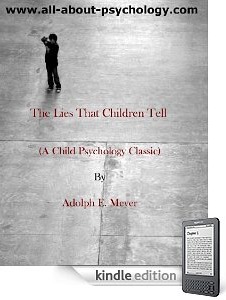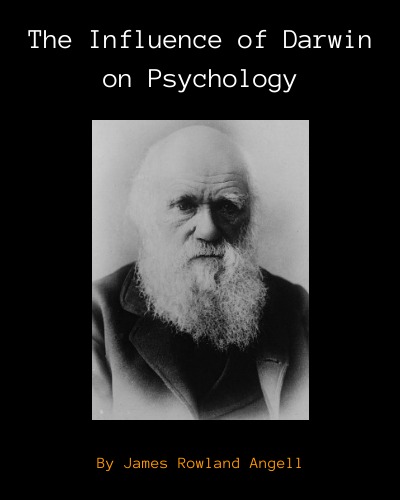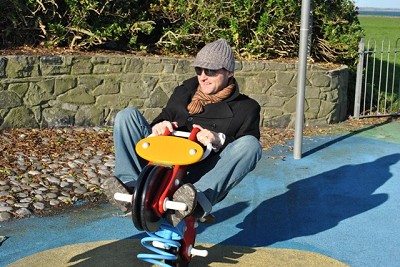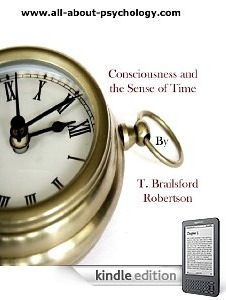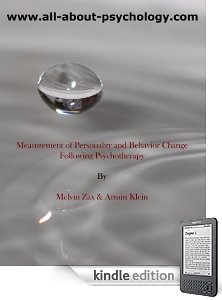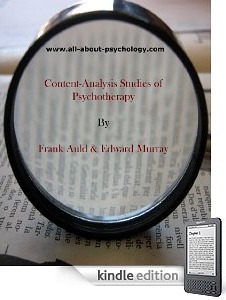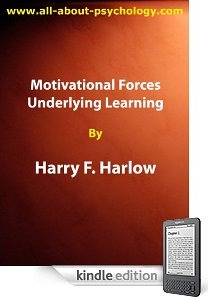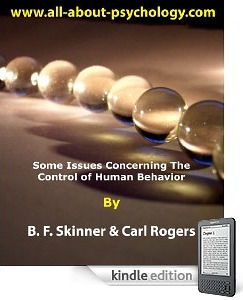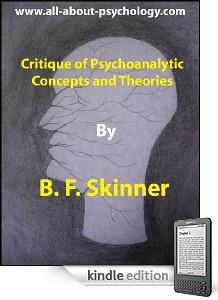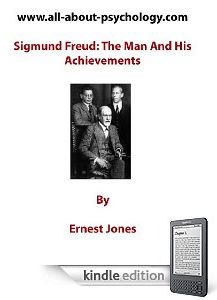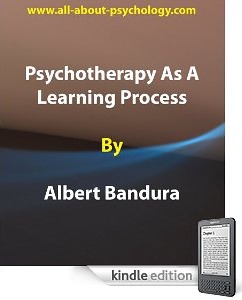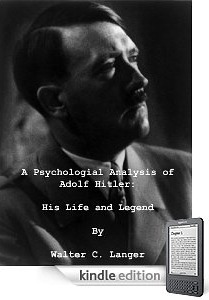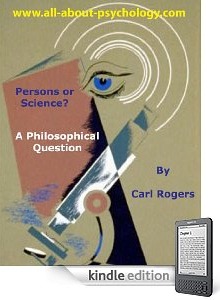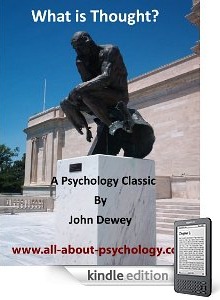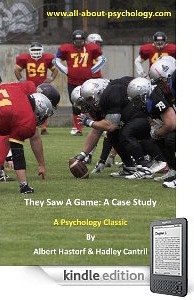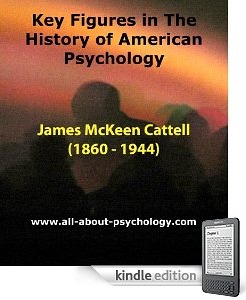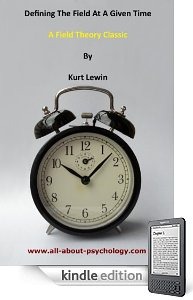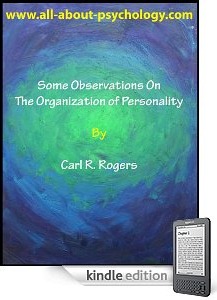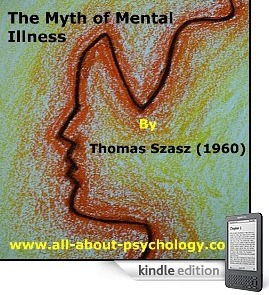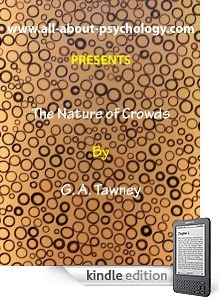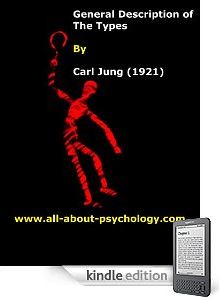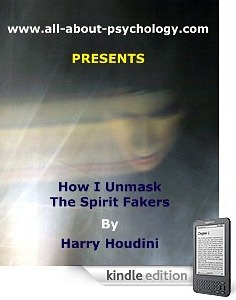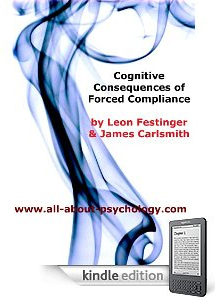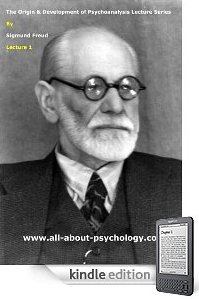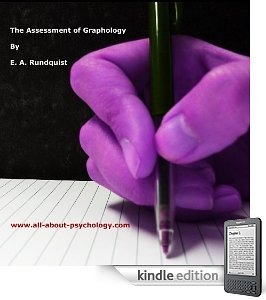|
Psychology on KindleWelcome to the Psychology on Kindle section of the website, a new page inspired by an increasing number of requests to make classic psychology studies available on kindle. For your convenience certain articles have been arranged within themed collections and these are showcased first. The Full Psychology on Kindle Collection is presented after the themed collections. Classic Articles All Psychology Students Should Read
This special Kindle collection consists of the most influential, infamous and iconic research articles ever published in the history of psychology. See following link for full details. The Psychology Classics Kindle Collection The Psychotherapy Collection
This particular Kindle collection consists of classic articles and book chapters about psychotherapy from such luminaries as Carl Rogers, Albert Bandura, Albert Ellis and Thomas Szasz. See following link for full details. About Psychotherapy Kindle Collection The Psychoanalysis Collection
A great collection of classic articles and book chapters concerning psychoanalysis in general as well as contributions from leading proponents of psychoanalysis in America. You can access the full Psychoanalysis Articles collection via the following link. The History of Psychology Collection
A great collection of significant articles and book chapters within the history of psychology. You can access the full History of Psychology Articles collection via the following link. History of Psychology Articles
Full List of Psychology on Kindle PublicationsConcepts of Trait and Personality By Gordon W. Allport
Originally published in 1927 this classic article by Gordon W. Allport highlights the ambiguity surrounding attempts to characterize personality traits. Having done this, Allport then outlines how the term "trait" can be rescued from the confusion in which he believes it to be embedded. Concepts of Trait and Personality Behavior and the Concept of Mental Disease By John B. Watson
First published in 1916 this classic article by "father of behaviorism" John B Watson provides an excellent early example of the author's attempt to move away from the language of psychoanalysis towards a more scientific psychological terminology. Behavior and the Concept of Mental Disease The Psychological Analysis of Dreams By Sándor Ferenczi
Originally published in 1910 this classic article by leading psychoanalyst Sándor Ferenczi outlines what the author sees as the more essential explanations and the most valuable facts within Sigmund Freud's theory of dreams. The Psychological Analysis of Dreams Are Psychologists Afraid of Therapy? By Keith Sward
Originally published in 1950 this classic article addresses the possible reasons underpinning what the author believes to be negative feelings towards psychotherapy among the wider psychological community. Among the possibilities raised are an overattachment to mental testing; the intangible quality of dynamic psychotherapy in comparison to research and diagnosis; the misconception that therapy and diagnostic research are dichotomous and the problem of the interprofessional relationship between psychology and medicine. Are Psychologists Afraid of Therapy? Reinforcement Today by BF Skinner
In this classic learning theory call to arms first published in 1958 B.F. Skinner attempts to characterize conceptions of reinforcement particularly in relation to the acquisition and maintenance of behavior. In introducing the article Skinner notes "The scope of reinforcement is still not fully grasped, even by those who have done most to demonstrate it, and elsewhere among psychologists cultural inertia is evident." A Developmental Theory of Intelligence by Henry Garrett
In this classic article on intelligence first published in 1946, the author discusses the notion that intelligence changes in its organization with increasing maturity; and in doing so suggests that abstract or symbol intelligence changes as age increases from a fairly unified and general ability to a loosely organized group of abilities or factors. A Developmental Theory of Intelligence Principles of Directive Counseling and Psychotherapy by Frederick Thorne
Originally published in 1948, this classic article outlines the origins of directive psychotherapy and addresses some important terminological considerations. The author notes that the purpose of the paper is to review the basic principles of directive psychotherapy and to help formulate a comprehensive system of counseling and psychotherapy which would integrate and relate the positive values of newer viewpoints with traditional methods. Principles of Directive Counseling and Psychotherapy The Experimental Analysis of Appetite by Paul Young
This classic article first published in 1941 presents a critical review of research into appetite. In setting out the aims of the review the author notes that his aim is to review the work of others and relate it to his own research; propose a reformulation of the field in terms of partial hungers, and make several suggestions for future research. The Experimental Analysis of Appetite Conflict, Frustration, And The Theory of Threat by Abraham Maslow
Originally published in 1943 this classic short article by eminent psychologist Abraham Maslow discusses the concept of threat in connection with conflict phenomena and attempts to provide a fuller description of the role that threat to the organism plays in the abnormal personality. Conflict, Frustration, And The Theory of Threat Contributions To The History of Psychology (1916-1921) by Coleman Griffith
In addressing the position of psychology since 1915 the author arranges the material under review into two groups, namely, the systematic and the experimental studies which moved the discipline of psychology forward; and the historical and biographical notes and the large and searching retrospections which related contemporary psychology at the time to earlier stages in the development of the science. This classic article is a great read for anybody interested in the history and development of psychology. Contributions To The History of Psychology (1916-1921) The Dynamics of Psychological Security-Insecurity by Abraham Maslow
Originally published in 1942 this important paper was one of the key references in Maslow's seminal publication A Theory of Human Motivation. The Dynamics of Psychological Security-Insecurity In Memory of Wilhelm Wundt By His American Students
Originally published in 1921 this classic publication in the history of psychology includes a series of letters from a number of Wundt's distinguished students including G. Stanley Hall, J. McKeen Cattell and E.B. Titchener. In Memory of Wilhelm Wundt By His American Students The Science of Personality: Nomothetic or Idiographic? by Samuel J. Beck
First published in 1953 and adapted from a presidential address of the division of clinical and abnormal psychology of the American Psychological Association, this article originally developed from research in schizophrenia. Within the article, three main areas are discussed: (1) Sub-and Suprapersonality research, (2) The uses of idiography (3) The limitations of nomothesis. The Science of Personality: Nomothetic or Idiographic? Body and Mind, An Indivisible Unit by André Tridon
This short treatise on the body and mind was originally published in 1920 as a chapter in the book Psychoanalysis and Behavior. Body and Mind, An Indivisible Unit The Unconscious by André Tridon
This concise treatise on the unconscious was originally published in 1920 as a chapter in the book Psychoanalysis and Behavior. Puritanism A Dignified Neurosis by André Tridon
Originally published in 1920 as a chapter in the book Psychoanalysis and Behavior, this particular article discusses puritanism within the context of human sexuality. Among the topics under review are egotism and destructive persecution. Puritanism A Dignified Neurosis Self-Knowledge Through Dream Study by André Tridon
First published in 1920 as a chapter in the book Psychoanalysis and behavior. Among the issues discussed in relation to Self-Knowledge Through Dream Study are how to remember dreams, emotion in dreams and useful nightmares. Self-Knowledge Through Dream Study The Neurotic Aspects of War by André Tridon
This fascinating critique was first published in 1920 as a chapter in the book Psychoanalysis and behavior. Among the issues discussed in relation to the neurotic aspects of war are: Displays of cruelty, the lure of the uniform, patriots and traitors, sexual license and neurotic death threats. Easy Lessons in Psychoanalysis by André Tridon (Lessons 1 to 3)
Originally published in 1921 the easy lessons series by renowned psychoanalyst André Tridon was designed to provide the reader with a highly accessible primer of psychoanalysis presented in simple language. This publication showcases lessons 1 to 3. Lesson 1. The Psychoanalytic Viewpoint Lesson 2. Dreams and Their Meaning Lesson 3. The Mind and The Brain Easy Lessons in Psychoanalysis (Lessons 1 to 3) Easy Lessons in Psychoanalysis by André Tridon (Lessons 5 to 7) by André Tridon
Originally published in 1921 the easy lessons series by renowned psychoanalyst André Tridon was designed to provide the reader with a highly accessible primer of psychoanalysis presented in simple language. This publication showcases lessons 5 to 7. Lesson 5. The Conscious and the Unconscious Lesson 6. Complexes and Education Lesson 7. The Hereditary Taint Easy Lessons in Psychoanalysis (Lessons 5 to 7) Easy Lessons in Psychoanalysis by André Tridon (Lessons 8 to 11) by André Tridon
Originally published in 1921 the easy lessons series by renowned psychoanalyst André Tridon was designed to provide the reader with a highly accessible primer of psychoanalysis presented in simple language. This publication showcases lessons 8 to 11. Lesson 8. The Neurosis Lesson 9. The Flight From Reality And The Regression Lesson 10. Pen Pictures of Neurotics Lesson 11. Genius And Neurosis Easy Lessons in Psychoanalysis (Lessons 8 to 11) Schools of Psychoanalysis: Freud, The Pioneer by André Tridon
First published in 1920 as a chapter of the author's book Psychoanalysis and behavior, this is a succinct, clear and concise account of Freud's role in the history, scope and influence of psychoanalysis. Schools of Psychoanalysis: Freud, The Pioneer Schools of Psychoanalysis: Jung, The Zurich School by André Tridon
First published in 1920 as a chapter of the author's book Psychoanalysis and behavior, this is a succinct, clear and concise account of Jung's role in the history, scope and influence of psychoanalysis. Schools of Psychoanalysis: Jung, The Zurich School Schools of Psychoanalysis: Adler, Individual Psychology by André Tridon
First published in 1920 as a chapter of the author's book Psychoanalysis and behavior, this is a succinct, clear and concise account of Adler's role in the history, scope and influence of psychoanalysis. Schools of Psychoanalysis: Adler, Individual Psychology Schools of Psychoanalysis: Kempf, Dynamic Mechanism by André Tridon
First published in 1920 as a chapter of the author's book Psychoanalysis and behavior, this is a succinct, clear and concise account of Kempf's role in the history, scope and influence of psychoanalysis. Schools of Psychoanalysis: Kempf, Dynamic Mechanism Can We Sublimate Our Cravings? by André Tridon
Originally published in 1920 as a chapter in the book Psychoanalysis and Behavior, this particular article addresses the concept of sublimation in relation to human sexuality. Among the topics discussed are sexual cravings, Madame Bovary and parasitic cravings. Can We Sublimate Our Cravings? The Love Life by André Tridon
First published in 1920 as a chapter in the book Psychoanalysis and Behavior, this particular article discusses love in the sense of a physical attraction and stimulation. Among the issues addressed are the choice of a mate, love at first sight, neurotic jealousy and fetichism. The Negative and The Positive Life by André Tridon
First published in 1920 as a chapter in the book Psychoanalysis and behavior, this particular article addresses the question of why so many people lead a negative life. Among the issues discussed are inferiority, withdrawing from reality, the craving for safety and neurotic superiority. The Negative and The Positive Life Sleep, Sleeplessness and Nightmares by André Tridon
Originally published in 1920 as a chapter in the book Psychoanalysis and behavior. Among the issues discussed in relation to sleep, sleeplessness and nightmares are dream symbols and anxiety dreams. Sleep, Sleeplessness and Nightmares A Critique of G.W. Allport's Theory of Motivation by Peter A. Bertocci
A classic article from 1940 in which the author examines Allport's theory of motivation; particularly the notion that personality development designed to account for the uniqueness, variety, and continuity of personal growth stems from functional autonomy and traits. A Critique of G.W. Allport's Theory of Motivation The Impact of Psychoanalysis on Medical Education and The Public 1910-1920 by C.P. Oberndorf
First published in 1953 as a chapter of the author's book A History of Psychoanalysis in America, this is a great read for anybody interested in the origins and influence of psychoanalysis. The Impact of Psychoanalysis on Medical Education and The Public 1910-1920 Issues Distinguishing Idiographic From Nomothetic Approaches To Personality Theory by John L. Falk
Originally published in 1956 this insightful personality theory article draws upon on the ideas of such luminaries as Allport, Lewin and London. Issues Distinguishing Idiographic From Nomothetic Approaches To Personality Theory Content and Style in Personality Assessment by Douglas Jackson & Samuel Messick
This classic article was adapted from a paper read at a symposium on experimental approaches to personality assessment at the American Psychological Association meetings in New york in 1957. The discussion within the article draws primarily upon the contention that in personality theory a ubiquitous and fundamental distinction may be drawn between the interpretation of behavior in terms of (a) the content of "needs" and of cognitive structures generally and in terms of (b) characteristic styles of response and action. Content and Style in Personality Assessment Post-World War II Deviations in Psychoanalytical Conceptions by C.P. Oberndorf
Originally published in 1953 as a chapter of the author's book A History of Psychoanalysis in America, this is a great read for anybody interested in the origins and influence of psychoanalysis. Post-World War II Deviations in Psychoanalytical Conceptions The Involvement of the Professional Therapist by Carl Whitaker, Thomas Malone & John Warkentin
Originally published in 1959 as part of a collection of case studies in counseling and psychotherapy. This particular contribution relates to the case of "Hilda" a thirty-year-old, married female with the chief complaints of repeated severe depressions and psychotic behavior. The Involvement of the Professional Therapist Surface and Depth in The Individual Personality by Nevitt Sanford
Adapted from a paper presented as the presidential address of the division of personality and social psychology of the American Psychological Association in 1955, this classic article sets out to address the author's contention that surface and depth, though common in the literature, are in essence vague and far from being employed as clearly defined technical terms. Surface and Depth in The Individual Personality Three Distinctions in The Study of Leaders by W.H. Cowley
Originally published in 1928 this classic paper discusses the notion that leadership is not a simple trait but rather a complex of many traits fashioned together as a unity; and whether or not any such series of traits can be isolated with certainty and precision. Three Distinctions in The Study of Leaders Character And Personality Traits by J.B. Maller
Classic article in which the author presents a comprehensive review of published personality measurement tests and studies which appeared during the year 1934. The tests and studies under review are arranged within a series of headings including: indirect measures of personality adjustment (e.g., the Rorschach); measures of attitudes and interests (including the methods of Thurstone and Strong); aptitude, appreciation, and background; techniques involving behavior; rating scales; observations; physical indices; expressive movements and work patterns; and analyses of personality. A great read and point of reference for anybody interested in the history and development of personality measurement and testing. Character And Personality Traits Motivation Reconsidered: The Concept of Competence by Robert W. White
In this classic critique on motivation first published in 1959 the author attempts a conceptualization in which he "gathers up" notable omissions from drive theory. To do this he introduces the concept of competence which he employs in its broad biological sense, and in doing so is able to examine relevant trends of thought in several areas of psychology. Motivation Reconsidered: The Concept of Competence The Nature of The Fundamental Drives by Edward Chace Tolman
Classic drive theory article originally published in 1925 in which the author discusses three criteria on the basis of which a specific fundamental drive appears to exist. The Nature of The Fundamental Drives Hypnotherapy in Anxiety and Depression by Jerome M. Schneck
Originally published in 1959 as part of a collection of case studies in counseling and psychotherapy. Hypnotherapy in Anxiety and Depression A Case of Pseudo-Neurotic Schizophrenia by Heinz Hafner
Originally published in 1959 as part of a collection of case studies in counseling and psychotherapy. In introducing this case the author notes that especially in the analysis of pseudo-neurotic schizophrenics, an attitude characterized by an ever-reliable presence and goodness of the therapist that gives security and warmth is required; and that this had to be established first in order to provide a key to the understanding of the case being presented. A Case of Pseudo-Neurotic Schizophrenia The Treatment of A Child and Family by Marcille H. Lakos & Nathan W. Akerman
Originally published in 1959 as part of a collection of case studies in counseling and psychotherapy, the authors note that their purpose is to describe the treatment of a disturbed child within the framework of a concomitant program of therapy. The Treatment of A Child and Family The Psychology of Fear by WM. R. Roalfe
Very much influenced by the dominant discourse within psychology at the time this classic article on the psychology of fear first published in 1929 explores notions such as that the explanation of the problem of fear is to be found in the study of desire is due to the relationship which exists between the conscious and unconscious aspects of the mind. The Phenomenological Approach To Social Psychology by Robert B. Macleod
First published in 1947 this classic article suggests that social psychology should look to develop a firmer methodological footing by drawing on developments within the psychology of perception. In outlining this position the author discusses the issues under review within three key areas. 1. Phenomenology in The Psychology of Perception. 2. Implicit Assumptions in Social Psychological Thinking. 3. Problems For A Social Phenomenology. The Phenomenological Approach To Social Psychology The Psychology of Alfred Adler by Wayland F. Vaughan
Excellent article first published in 1927 documenting the key ideas of Alfred Adler. In introducing the article the author notes: "Convinced of the value of Adler's contribution, I believe it worthwhile to survey the principal tenets of his system in such a lucid manner as to awaken the interest of the general psychologist. I have selected those aspects of his theory that bear particularly upon the understanding of normal personality." These include: The Psychology of Alfred Adler Estimating Human Character by Glen U. Cleeton
Classic article on character analysis and judgment that was first published in 1926. In discussing the history of thinking on the human character the author makes reference to Greek philosophy, the Swiss naturalist Johann Kaspar Lavater and the phrenology movement during the early part of the nineteenth century. The Field of Action Research by Isidor Chein, Stuart W. Cook & John Harding
Classic article on action research adapted from an address given at the Institute of the Society for Social Research at the University of Chicago in 1946. The article is organized within three key areas i.e., the scientific setting of action research, special difficulties in action research and varieties of action research. Early Nineteenth Century Precursors of Freud's Thinking by C. P. Oberndorf
Originally published in 1953 as a chapter of the author's book A History of Psychoanalysis in America, this is a great read for anybody interested in the origins of psychoanalysis. Early Nineteenth Century Precursors of Freud's Thinking The Lies That Children Tell by Adolph E. Meyer
Landmark paper in the history of child psychology. Originally published in 1926, author and eminent psychologist Adolph E. Meyer notes that his article is an attempt to consider one aspect of the child's many sided behavior - the lie, and that he chose this particular phase of child life not only because it is unquestionably one of far-reaching interest but also because so little published research on the topic exists. The historical significance of the article is highlighted by Meyer's assertion that with "the growing tendency to see in psychology a study of human behavior rather than of the human mind, child study is gradually emancipating itself from the impeding tentacles of tradition." A must read for anybody interested in the history and practice of child psychology. Conceptual Thinking by Walter Libby
This classic article on conceptual thinking was originally delivered in 1922 as part of a lecture series entitled "The Psychology and Logic of Research," given to the Industrial Fellows of the Mellon Institute. See following link for full details. The Reflex Arc Concept in Psychology by John Dewey
Originally published in Psychological Review in 1896 this landmark article is accepted as the origin of functionalism. In 1943 the Psychological Review celebrated it's 50th anniversary and in its Jubilee edition selected The Reflex Arc Concept in Psychology by John Dewey as its most important article. A true classic in the history of psychology. See following link for full details. The Reflex Arc Concept in Psychology The Influence of Darwin on Psychology by James Rowland Angell
Fascinating article examining three of Darwin's more specific contributions to psychology, namely: (1) his doctrine of the evolution of instinct and the part played by intelligence in the process; (2) the evolution of mind from the lowest animal to the highest man; and (3) the expressions of emotion. See following link for full details. The Influence of Darwin on Psychology Formal Instruction in Psychoanalysis Develops, 1930-1940 by C.P Oberndorf
Originally published in 1953 as a chapter of the author's book A History of Psychoanalysis in America, this is a great read for anybody interested in the origins and early practice of psychoanalysis. See following link for full details. Formal Instruction in Psychoanalysis Develops, 1930-1940 Intellectualizing Techniques in Psychotherapy by Ruth L. Munroe
Originally published in 1959 as part of a collection of case studies in counseling and psychotherapy, this particular offering was introduced by the author as follows: This contribution focuses on what I call "intellectualizing techniques." I mean here the use of "intellectualization" by the therapist as a conscious tool. He falls in with the patient's way of thinking, but is not the dupe of the patient's intellectualizing defenses. He uses the capacity of the patient to "think" and his wish to "understand" constructively within the therapeutic situation as a means of (a) building up the transference on a broad ego-syntonic level, (b) using this transference as the stabilizing background for the ups-and-downs of therapy, and (c) as security for relatively bold active interpretations, guarded by their "intellectualized" format. See following link for full details. Intellectualizing Techniques in Psychotherapy Recollections of Psychoanalysis in Vienna, 1921-1922 by C. P. Oberndorf
Originally published in 1953 as a chapter of the author's book A History of Psychoanalysis in America, this is a great read for anybody interested in the origins of psychoanalysis. See following link for full details. Recollections of Psychoanalysis in Vienna, 1921-1922 The Managing of Acting Out in a Borderline Personality by Don D. Jackson
Originally published in 1959 as a contribution to a collection of case studies in counseling and psychotherapy, this is the description of the intensive psychotherapy of a thirty-one-year-old housewife and mother. In introducing his patient the author notes that her chief complaints were periods of severe depression and lack of appetite with consequent weight loss and that questioning during the four preliminary, exploratory interviews revealed that she also suffered from severe headaches, insomnia, nearly total amenorrhea, cancerophobia, and frigidity. She was afraid to be alone day or night, and had made two serious suicide attempts-the last one a few weeks before therapy started. See following link for full details. The Managing of Acting Out in a Borderline Personality Recollections of A Psychoanalytic Psychotherapy: The Case of "Prisoner K" by Thomas-szasz
Originally published in 1959 as a contribution to a collection of case studies in counseling and psychotherapy, this is a fascinating account of a particular example of "psychoanalytic psychotherapy" undertaken by Thomas Szasz; who was soon to elevated into a position of international renown and controversy upon the publication of his classic text "The Myth of Mental Illness." A must read for anybody interested in the history and practice of psychotherapy. See following link for full details. Recollections of A Psychoanalytic Psychotherapy: The Case of "Prisoner K" Why Do We Laugh? by Wilson D. Wallis
A classic article from 1922 exploring the psychology of laughter. See following link for full details. The Social Need For Scientific Psychology by Knight Dunlap
First published in 1920 this psychological "call to arms" addresses topics which are just as relevant today. For instance the author discuses the problem of pseudo-psychology, as he notes: "It is a matter of common knowledge to all, that not every one who labels himself a "psychologist," or to whom the label is tossed by journalist and popular writer, is entitled to the designation." See following link for full details. The Social Need for Scientific Psychology The Psychology of Conviction by Joseph Jastrow
Originally published in 1917 this historically important article arose directly from the horrors unfolding during the first world war. In introducing his article the eminent psychologist Professor Joseph Jastrow notes that "A notable contribution of the world convulsion of 1914 and thereafter is to the psychology of conviction." Jastrow then sets about discussing the notion that "The psychology of conviction surveys the play of forces that shape the aims of men." See following link for full details. The Interpretation of Intelligence Tests by James McKeen Cattell
Classic article on the interpretation of intelligence tests, with special reference to the problem of ascertaining the extent to which the performance of an individual depends on heredity and environment. The paper was originally presented by James McKeen Cattell as part of a symposium of the Section of Psychology of the American Association for the Advancement of Science, in Cincinnati, December 1923. See following link for full details. The Interpretation of Intelligence Tests Consciousness and the Sense of Time by T. Brailsford Robertson
Classic paper on consciousness originally published in 1923. Among the issues discussed is the hypothesis that the only consciousness of which we are ever normally aware is that minute fraction which constitutes our waking consciousness. See following link for full details. Consciousness and the Sense of Time Psychotherapy And The Placebo Effect by David Rosenthal & Jerome D. Frank
Originally published in 1956 this classic article describes the placebo effect, discuss some of its implications for the evaluation of psychotherapy, and make some recommendations concerning research design in psychotherapy based on these considerations. See following link for full details. Psychotherapy And The Placebo Effect Measurement of Personality and Behavior Change Following Psychotherapy by Melvin Zax & Armin Klein
Originally published in 1960 this article sets out to summarise and evaluate some of the approaches which have been used to deal with the problem of the criterion employed within evaluatory research in psychotherapy. See following link for full details. Measurement of Personality and Behavior Change Following Psychotherapy Content-Analysis Studies of Psychotherapy by Frank Auld & Edward Murray
This ground breaking article first published in 1955 attempts to review the considerable body of literature on content analysis of recorded psychotherapy interviews. The articles reviewed are organized within a series of key headings e.g., attitudes toward self, movement from problems to insight, differences between different therapies etc. Quite simply a must read for anybody interested in the history and practice of psychotherapy. See following link for full details. Content-Analysis Studies of Psychotherapy The Father of Modern Psychology by Foster Watson
First published in 1915 this illuminating article documents the influence of Juan Luis Vives as a pioneer of modern psychological thinking. As the author notes: The self-conscious emphasis on induction as a method of inquiry and discovery in philosophical, and particularly in psychological questions, must be taken back beyond and before Descartes and Bacon, to Juan Luis Vives. See following link for full details. The Father of Modern Psychology The Conflict of the Psychologies by Joseph Jastrow
Originally published in 1929 This classic article documents what eminent psychologist Joseph Jastrow saw as the internal warfare within the discipline of psychology. In examining both Fruedianism and Gestaltism the author explores the notion that the struggle for the establishment of psychology rests with the conflict between pre-naturalistic, anti-naturalistic or super-naturalistic positions versus naturalistic psychology that has been in the making since Darwin. See following link for full details. The Conflict of the Psychologies Habit by William James
This classic article exploring the philosophy and psychology of habit was originally published in Popular Science Monthly in 1887 and later as a chapter in James' landmark book "principles of psychology." See following link for full details. On Some Mental Effects of The Earthquake by William James
At the time of "The Great" 1906 San Francisco earthquake eminent American psychologist William James was at Leland Stanford University nearby. He succeeded in getting into San Francisco on the morning of the earthquake, and spent the remainder of the day in the city. James documented his observations that year in the June edition of Youth's Companion and later as a chapter in his book Memories and Studies which was first published in 1911. See following link for full details. On Some Mental Effects of The Earthquake Hypnotism in Scientific Perspective by Clark L. Hull
First published as an article in 1929 by the eminent American psychologist Clark L. Hull, this excellent account of the history of hypnosis documents the influence of Mesmer, Braid, Liébeault, Charcot, Coué and Abbé. A must read for anybody interested in exploring the origins and scientific worth of hypnosis. See following link for full details. Hypnotism in Scientific Perspective The Identity of Inhibition with Sleep and Hypnosis by Ivan Pavlov
This classic article by the eminent physiologist and psychologist Ivan Pavlov was first delivered in the form of a lecture at the University of Chicago in July 1923. In the article Pavlov draws on his seminal research into classical conditioning conducted with dogs. See following link for full details. The Identity of Inhibition with Sleep and Hypnosis The Psychology of Wish Fulfilment by John B. Watson
In this classic article originally published in 1916, "father of behaviorism" John B. Watson begins his critique of the psychology of wish fulfilment by examining the origins and scope of the Freudian perspective. He then goes on to address the topic in relation to suppressed wishes, dream analysis and the biological basis of the wish. See following link for full details. The Psychology of Wish Fulfilment Studies in Infant Psychology by John B. Watson & Rosalie Rayner Watson
Originally published in 1921 this manuscript was prepared on the basis of the experimental work conducted by Watson and Rayner in the psychological laboratory of Johns Hopkins University in 1919 and 1920. Included in the reporting of this research is reference to the infamous experiment on conditioned emotional reactions which would become known forever as "The case of little Albert." See following link for full details. Motivational Forces Underlying Learning by Harry F. Harlow
Drawing on his seminal research on the manipulation and exploration drives in monkeys this classic paper by Harlow was originally presented in 1954 as part of a symposium designed to encourage closer integration between learning theory, personality theory and clinical research. See following link for full details. Motivational Forces Underlying Learning Marijuana Dependence and its Treatment by Alan Budney, Roger Roffman, Robert Stephens & Denise Walker
Originally published by the U.S Department of Health and Human Services this paper reviews the problems associated with marijuana use, including unique characteristics of marijuana dependence, and the results of laboratory research and treatment trials to date. It also discusses limitations of current knowledge and potential areas for advancing research and clinical intervention. See following link for full details. Marijuana Dependence and its Treatment Some Issues Concerning The Control of Human Behavior by B.F. Skinner & Carl Rogers
This classic debate between Skinner and Rogers took the form of three papers originally published in 1956. The papers were based on material presented by the authors in a symposium held at the annual meeting of the American Psychological Association. The first paper is by Skinner, the second paper by Rogers and the third paper (a rebuttal of the second) was again by Skinner. This compelling debate not only offers a fascinating insight into the thinking of two of the most influential psychologists of the 20th Century but it also provides a wonderful historical snapshot of the theoretical and ideological battles going on within psychology at the time. See following link for full details. Some Issues Concerning The Control of Human Behavior Critique of Psychoanalytic Concepts and Theories by B.F. Skinner
Classic article originally published in 1954 in which B.F Skinner critically evaluates Sigmund Freud's contribution to Western thought. In particular Freud's attempt to infer how the mental apparatus is constructed and what forces interplay and counteract in it. See following link for full details. Critique of Psychoanalytic Concepts and Theories A Criminal Investigative Analysis of Jack The Ripper by John Douglas
Originally published in 1988, this previously classified FBI dossier documents the criminal investigative analysis prepared by criminal profiling pioneer John Douglas; who at the time of writing was a special agent at the FBI National Center for the Analysis of Violent Crime (NCAVC). In presenting his analysis of the infamous Jack The Ripper serial murder case, Douglas addressed a number of key areas, these included: Note From The Editor As well as been able to read this classic publication in full, links to a series of information resources have also been included for anybody who would like to learn more about criminal profiling. See following link for full details. A Criminal Investigative Analysis of Jack The Ripper The Early Development of Conscience in The Child by Melanie Klein
Originally published in 1944 as part of a collection of essays on psychoanalysis, this classic article explores aspects of Klein's seminal work on the psychoanalysis of children, in particular the foundations upon which a child's super-ego is built. See following link for full details. The Early Development of Conscience in The Child Sigmund Freud: The Man And His Achievements by Ernest Jones
Originally published in 1956, Sigmund Freud: The Man And His Achievements was one of four centenary memorial addresses by renowned psychoanalyst (and Sigmund Freud's official biographer) Ernest Jones. In outlining the nature of this tribute to Freud, Jones notes: "Sigmund Freud was born a hundred years ago. That simple fact is being commemorated today in most countries of the world from India and Japan to Canada and the Argentine. Plainly such commemoration is a token of Freud's significance, and I shall try in a few words to indicate the nature of that significance, and also to describe what manner of man he was." See following link for full details. Sigmund Freud: The Man And His Achievements The Problem of Psychotherapy by Laurance Shaffer
Originally presented in 1947 as the address of the President of the Division of Clinical and Abnormal Psychology, American Psychological Association; this landmark paper draws attention to issues relating to the nature of the therapeutic process within psychotherapy which are just as relevant today: How can we understand what takes place in the therapeutic interview? Why does it readjust the distressed person? Under what conditions is psychotherapy applicable? What techniques, applied in appropriately selected circumstances will produce predictable and effective results? Shaffer's central argument is that the psychologist's major problem with respect to therapy is not that of the professional conditions of practice, but is the problem of understanding what therapy is and does. See following link for full details. Anxiety, Fear, And Social Affiliation by Irving Sarnoff & Philip Zimbardo
Early research paper co-authored by world renowned psychologist Philip Zimbardo exploring the psychological properties of emotion. The primary objectives of the research were to assess the empirical validity of conceptual differentiation between fear and anxiety and to evaluate the extent to which the theory of social comparison processes may be applied to the relationship between all emotions and affiliative behavior. With it's use of deception and the need to induce a high level of fear, this experimental study also serves as another classic example of just how differently ethical conduct within psychological research was viewed in the past. See following link for full details. Anxiety, Fear, And Social Affiliation Psychotherapy As A Learning Process by Albert Bandura
Classic paper by eminent psychologist Albert Bandura exploring systematic attempts to apply principles of learning to the area of psychotherapy. Bandura begins this exploration by asking whether human behavior can be modified through psychological means and if so, what are the learning mechanisms that mediate behavior change? He then sets about discussing some of these learning mechanisms in turn i.e., counterconditioning, extinction, discrimination learning, methods of reward, punishment and social imitation. See following link for full details. Psychotherapy As A Learning Process Dynamics of Personality Organization by Abraham Maslow
A classic critique originally published in two parts which Maslow described as follows: "I conceive this paper to be, not a theoretical paper in the ordinary sense, but rather a set of theoretical conclusions emerging directly from research data on the organization of the human personality." See following link for full details. Dynamics of Personality Organization The Development of Insight in A Counseling Relationship by Carl Rogers
Classic counseling paper in which Carl Rogers addresses the question of how an individual client may come to an effective understanding of himself/herself. See following link for full details. The Development of Insight in A Counseling Relationship Counseling: An Educational Research Review by Carl Rogers
A classic review of counseling in an educational context in which Carl Rogers addresses the general formulations of significant hypotheses in counseling, objective studies of the process involved in interviewing, research regarding outcomes, and what he saw at the time as new developments challenging further research. See following link for full details. Counseling: An Educational Research Review Rational Psychotherapy and Individual Psychology by Albert Ellis
This classic article by Albert Ellis is one of the first published accounts of rational psychotherapy; a theory of personality and a system of therapeutic technique that would eventually develop into what is now known as rational emotive behavior therapy. In the course of this landmark paper Ellis introduces and expands upon his hypothesis that thinking represents the most important way in which human emotion is caused and controlled. He then goes on to outline the main points of agreement and disagreement between rational therapy and the individual Psychology of Alfred Adler. See following link for full details. Rational Psychotherapy and Individual Psychology A Psychological Analysis of Adolf Hitler: His Life and Legend by Walter C. Langer
In 1943 William Donovan the director of the Office of Strategic Services (the forerunner to the CIA) approached Harvard psychologist Walter Langer and asked him to construct a psychological profile of Adolf Hitler. Despite his reservations regarding the reliability of the data on which his analysis would be based, Langer set about this unprecedented task by putting together a team of psychologists and researchers. Langer and his research team had just five months to produce their findings, during which time they interviewed key informants who knew Hitler personally and drew upon over 1000 pages of background research from a document known as The Hitler Source Book. A Classic in The History of Psychology Langer's report on Adolf Hitler not only showcased the dominant discourse of psychological analysis at the time, but it also served as the catalyst for the development of political profiling as a discipline. Freudianism at its Height In constructing Hitler's psychological profile, Langer drew heavily upon the ideas of Sigmund Freud, most notably the developmental influence of early childhood experiences. As such the report provides the reader with a fascinating window into the mechanics of Freudian analysis. Psychology Gets Political Without doubt the greatest legacy of Langer's report was the influence it had on the field of political profiling. Dr Jerrold Post cites Langer's analysis of Hitler as the inspiration for the profiling unit he established at the CIA in the 1970s; a unit that would go on to profile every important world leader up to and including Saddam Hussein. In discussing Langer's psychological profile of Hitler during an interview with the BBC, Post stated: "We must understand the leaders we are contending with - you can't deter optimally a leader you don't understand - and to relegate be it a Hitler or a Joseph Stalin or a Saddam Hussein to a crazy evil madman really degrades our capacity to deal with them optimally because we're not thinking about what pushes them, what makes them tick." While the value of political profiling remains open to question, the seminal importance of Langer's psychological study of Hitler in influencing the discipline is not. A Word From The Editor In the original report Hitler's first name is recorded as Adolph. In this newly edited version the more commonly used spelling of Adolf is used throughout. See following link for full details. A Psychological Analysis of Adolf Hitler: His Life and Legend The Processes of Therapy by Carl Rogers
Classic article from 1940 in which Carl Rogers outlines the conditions for successful psychotherapy. Namely; rapport, free expression of feeling on the part of the client, recognition and acceptance by the client of his spontaneous self, responsible choices, the gaining of insight through assimilated interpretation and independence with support. See following link for full details. Persons or Science? A Philosophical Question by Carl Rogers
Fascinating insight into the thinking of one of the most influential and eminent psychologists of the 20th Century. Carl Rogers described this particular paper as "a highly personal document, written primarily for myself, to clarify an issue which has become increasingly puzzling." An issue he described as follows: As I have acquired experience as a therapist, carrying on the exciting, rewarding experience of psychotherapy, and as I have worked as a scientific investigator to ferret out some of the truth about therapy, I have become increasingly conscious of the gap between these two roles. The better therapist I have become (as I believe I have), the more I have been vaguely aware of my complete subjectivity when I am at my best in this function, And as I have become a better investigator, more "hardheaded" and more scientific (as I believe I have) I have felt an increasing discomfort at the distance between the rigorous objectivity of myself as scientist and the almost mystical subjectivity of myself as therapist. This paper is the result. See following link for full details. Persons or Science? A Philosophical Question What is Thought? by John Dewey
This classic paper was first published as chapter one in Dewey's iconic book How We Think in 1910. Dewey explores the question of what is thought within three major headings; varied senses of the term, the central factor in thinking and elements in reflective thinking. See following link for full details. They Saw A Game: A Case Study by Albert Hastorf & Hadley Cantril
This iconic study in selective perception demonstrates how an Ivy League football game was perceived differently by opposing fans. This simply designed psychology classic formed the basis for additional research into concepts such as social cognition and cognitive bias. See following link for full details. The Fallacy of Personal Validation: A Classroom Demonstration of Gullibility by Bertram R. Forer
Brilliant social experiment By Bertram R. Forer exposing the human tendency to be overly impressed by vague statements which in turn leads results in people endowing those offering such statements with an unwarranted high degree of insight. In other words, things do not need to be accurate to be perceived as accurate. A realization, which for those in know can be exploited very effectively. See following link for full details. The Fallacy of Personal Validation: A Classroom Demonstration of Gullibility Key Figures in The History of American Psychology: James McKeen Cattell by R.S. Woodworth
Written shortly after Cattell's death in 1944 this article offers an excellent insight into the contribution of one of the most important figures in the history of American psychology. See following link for full details. Key Figures in The History of American Psychology: James McKeen Cattell The History of Dream Theory by Harold McCurdy
Originally published in 1946 this illuminating article attempts to supplement the historical section of Sigmund Freud's Interpretation of Dreams by drawing on the work of ancient writers such as Aristotle, Plato, Lucretius and Artemidorus. See following link for full details. Defining The Field At A Given Time by Kurt Lewin
This Field Theory Classic by Kurt Lewin was originally presented as a paper at a Symposium on Psychology and Scientific Method held as part of the Sixth International Congress for the Unity of Science at The University of Chicago in 1941. At the time Lewin was arguing that Field theory was probably best characterized as a method of analyzing causal relations and of building scientific constructs. See following link for full details. Defining The Field At A Given Time Heredity, Environment, and The Question "How?" by Anne Anastasi
Originally presented by Anne Anastasi as an address of the President (Division of General Psychology) of the American Psychological Association in 1957 and first published in psychological review the following year. This child psychology and nature nurture debate classic argues that the question "How?" offers a much more constructive approach to the heredity-environment problem; as opposed to the question "Which one?" or "How much?" typically posited by psychologists. See following link for full details. Heredity, Environment, and The Question "How?" The Men Who Murdered: FBI Behavioral Science Unit Publication
This landmark publication in the history of FBI profiling was the first study of sexual homicide and crime scene patterns from a law enforcement perspective. Based on interviews conducted by FBI Special Agents with incarcerated sexual murderers; a sub-sample of 36 sexual murderers was selected for analysis with the aim of fostering an understanding of some of the dynamics behind sexually deviant behavior and to develop further information for profiling such murders. This publication presents what those involved in the interviewing process learned about the 36 sexual murderers. See following link for full details. On The Witness Stand: Essays on Psychology & Crime by Hugo Münsterberg
Essential reading for anybody connected with psychology within a legal context. On The Witness Stand: Essays on Psychology & Crime was years ahead of its time exploring issues are just as important and relevant today e.g., witness memory, suggestibility and false confessions. A true classic. See following link for full details. On The Witness Stand: Essays on Psychology & Crime Psychological Notes on Helen Keller by Joseph Jastrow
Listed in Gallup´s most widely admired people of the 20th Century, deaf-blind Helen Keller's remarkable life was a profound example of triumph over adversity. During her widely publicized visit to the World's Fair in the summer of 1893, accompanied by her equally remarkable teacher Anne Sullivan and Dr. Alexander Graham Bell; a series of tests and observations were undertaken on Helen Keller at the Psychological Laboratory in the Anthropological Building at the World's Fair, Chicago. Among the tests conducted on Helen Keller were tests of touch and movement and various tests of memory. Professor Joseph Jastrow who conducted the tests first published his findings the following year in 1894 - findings republished here in Kindle format. See following link for full details. Psychological Notes on Helen Keller Psychology and History by Hugo Münsterberg
Originally presented as the President's Address at The American Psychological Association, New York Meeting in December 1898. This Hugo Münsterberg classic was first published in Psychological Review the following year. In a detailed critique, Münsterberg explores the relationship between psychology and history on a number of levels - ontologically, epistemologically etc; and in doing so sets about addressing the limits of psychology at the time. See following link for full details. The Development of Psychology
The Development of Psychology first appeared as an editorial in The Popular Science Monthly in 1874. This classic publication in the history of psychology evaluates the contribution to the discipline of John Stuart Mill, Alexander Bain, and Herbert Spencer. The scientific standing of psychology is also addressed in detail. See following link for full details. Humanism: A Review by John Dewey
Article first published in 1904 in which John Dewey reviews F. C. S. Schiller's book 'Humanism: Philosophical Essays'. This classic publication offers an illuminating insight in to John Dewey's views on humanism. See following link for full details. Some Observations On The Organization of Personality by Carl Rogers
First published in American Psychologist and originally presented as an address of the retiring President of the American Psychological Association. In this classic text, Rogers presents his observations on the organization of personality around a number of key themes; including: See following link for full details. Some Observations On The Organization of Personality Psychology As The Behaviorist Views It by John B Watson
First published in Psychological Review and originally presented as a lecture at Columbia University in 1913. "Psychology as the Behaviorist Views It", would become known forever as the "behaviorist manifesto" and bestow on Watson the title of "father of behaviorism." This classic publication is essential reading for psychology students, educators and professionals. See following link for full details. Psychology As The Behaviorist Views It The Social Self by George Herbert Mead
First published in 1913 this was a landmark article by one of the most influential figures in the history of American philosophy and social behaviorism. See following link for full details. Criminal Profiling from Crime Scene Analysis by John Douglas, Robert Ressler, Ann Burgess & Carol Hartman
This seminal publication in the history of FBI profiling was released by the U.S. Department of Justice as part of the information on serial killers provided by the FBI's Training Division and Behavioral Science Unit at Quantico, Virginia. Topics addressed include: See following link for full details. Criminal Profiling from Crime Scene Analysis The Myth of Mental Illness by Thomas Szasz
This classic publication elevated Thomas Szasz into a position of international renown and controversy. According to Szasz, the concept of mental illness is fundamentally flawed because it is based on the premise that it is caused by nervous system disorders; in particular brain disorders which manifest themselves via abnormal thought patterns and behavior. To Thomas Szasz most cases of "mental illness" are routed within a social context, and are in fact problems of living, and should, therefore, be recognized as so. See following link for full details. Aphasia by Adolf Meyer
Article first published in 1905 in which Adolf Meyer discusses Wernicke's views on aphasia. This classic publication offers a fascinating historical insight in to the theory and psychology of aphasia. See following link for full details. A Psychological Assessment of Crime Profiling by Richard Ault & James Reese
A Psychological Assessment of Crime Profiling is one of a series of landmark articles written by members of the Behavioral Science Units, National Center for the Analysis of Violent Crime, at the FBI Academy. See following link for full details. A Psychological Assessment of Crime Profiling The Nature And Meaning of Dogmatism by Milton Rokeach
The psychology of dogmatism is as relevant today as when Dr. Milton Rokeach began his pioneering work into this enduring topic. The ideas contained within this seminal paper informed the development of the Rokeach Dogmatism Scale and stimulated research into the psychology of human belief systems and dogmatism as a personality trait. See following link for full details. The Nature And Meaning of Dogmatism Serial Murder: Multi-Disciplinary Perspectives For Investigators by The U.S Department of Justice
In 2005 the FBI’s National Center for the Analysis of Violent Crime, Behavioral Analysis Unit hosted a 5 day symposium on serial murder. The goal of the Symposium was to bring together a group of respected experts on serial murder from a variety of fields and specialties, to identify the commonalities of knowledge regarding serial murder. A total of 135 subject matter experts attended the five-day event. These individuals included law enforcement officials who have successfully investigated and apprehended serial killers; mental health, academic, and other experts who have studied serial killers and shared their expertise through education and publication; officers of the court, who have judged, prosecuted, and defended serial killers; and members of the media, who inform and educate the public when serial killers strike. The agenda encompassed a variety of topics related to serial murder including common myths, definitions, typologies, pathology and causality, forensics, the role of the media, prosecution issues, investigative task force organization, and major case management issues. This invaluable publication is based on the input and discussion of the attendees on the major issues related to serial murder. The contents are based upon the notes taken during the presentations, panel discussions, and break-out group sessions. These were: See following link for full details. Serial Murder: Multi-Disciplinary Perspectives For Investigators The Nature of Crowds by G. A. Tawney
A landmark article in the theory of crowd psychology in which G.A. Tawney discusses such things as the crowd-mind, group-influence, mob-consciousness and homogeneity. See following link for full details. Criminal Profiling: A Viable Investigative Tool Against Violent Crime
In the early 1970s, Special Agent Howard Teten and others in the FBI began to apply the insights of psychological science to violent criminal behavior. In 1972, the FBI Academy launched a Behavioral Science Unit—later called the Behavioral Analysis Unit—which began looking for patterns in the behavior of serial rapists and killers. Agents John Douglas and Robert Ressler conducted systematic interviews of serial killers like John Wayne Gacy, Ted Bundy, and Jeffrey Dahmer to gain insight into their modus operandi, motivations, and backgrounds. This collected information helped agents draw up profiles of violent criminals eluding law enforcement. By the 1980s, the concept of criminal investigative analysis was maturing into a full-fledged investigative tool for identifying criminals and their future actions by studying their behaviors, personalities, and physical traits. Accordingly, in July 1984, the Bureau opened the National Center for the Analysis of Violent Crime (NCAVC) on the campus of the FBI Academy to provide sophisticated criminal profiling services to state and local police for the first time. Criminal Profiling: A Viable Investigative Tool Against Violent Crime is one of a series of landmark articles written by members of the Behavioral Science Units, National Center for the Analysis of Violent Crime, at the FBI Academy. See following link for full details. Criminal Profiling: A Viable Investigative Tool Against Violent Crime General Description of The Types by Carl Jung
General Description of The Types was a landmark chapter in "Psychological types" Carl Jung's major work on personality. In this classic account Jung sets out to describe introverted and extraverted types along thinking, feeling, rational, sensation, intuitive and irrational dimensions. See following link for full details. General Description of The Types How I Unmask The Spirit Fakers by Harry Houdini
Article first published in 1925 in which The Great Houdini exposes the trickery of fake spirit mediums. See following link for full details. How I Unmask The Spirit Fakers Cognitive Consequences of Forced Compliance by Leon Festinger & James Carlsmith
If you study psychology there is a very good chance that you will be introduced to the theory of cognitive dissonance. This robust theory suggests that a motivational state of inner tension is triggered by logically inconsistent ways of thinking. Cognitive Consequences of Forced Compliance by Leon Festinger & James Carlsmith was the first of numerous studies to corroborate the theory of cognitive dissonance. The premiss for this classic piece of research was to test what happens to a person's private opinion if he is forced to do or say something contrary to that opinion. See following link for full details. Cognitive Consequences of Forced Compliance Play And its Role in The Mental Development of The Child by Lev Vygotsky
Despite his premature death at the age of just 37, Lev Vygotsky is widely considered as one of the leading developmental psychologists of the 20th century. In addition to his seminal contribution to the relationship between language and thought, Lev Vygotsky also put forward ideas regarding the psychology of play, in particular the process of self-regulation through creative play. This classic article which was originally given in the form of a speech provides several key insights into Lev Vygotsky's theories of play. See following link for full details. Play And its Role in The Mental Development of The Child Psychoanalysis Lecture Series (Lecture One) by Sigmund Freud
The Lecture Series on the origin and development of psychoanalysis by Sigmund Freud arose from an invitation Freud accepted from American psychologist G. Stanley Hall, to discuss his views on abnormal psychology. The lectures were timed to coincide with the celebration of the Twentieth Anniversary of the opening of Clark University, Worcester, Massachusetts in September 1909. Freud delivered a total of five lectures. This is the first of those lectures, the content of which includes the contribution of Dr. Joseph Breuer and case studies on the psychology of hysteria. See following link for full details. Psychoanalysis Lecture Series (Lecture One) Significant Aspects of Client-Centered Therapy by Carl Rogers
This Carl Rogers classic is a must read for anybody interested in psychotherapy and counseling. In this landmark publication Carl Rogers outlines the origins of client-centered therapy, the process of client-centered therapy, the discovery and capacity of the client and the client-centered nature of the therapeutic relationship. See following link for full details. Significant Aspects of Client-Centered Therapy Autism Spectrum Disorders Information Guide
This detailed guide provides information relating to autism symptoms, causes, and treatments, along with with information on getting help and coping. Information in the guide is organized under the headings: Sourced from The National Institute of Mental Health this guide is for information purposes only and SHOULD NOT be considered a substitute for professional psychological, psychiatric or medical advice, diagnosis, or treatment. See following link for full details. Autism Spectrum Disorders Information Guide Depression Information Guide
This detailed guide offers information relating to depression symptoms, causes, and treatments, along with with information on getting help and coping. Information in the guide is organized under the headings: Sourced from The National Institute of Mental Health this guide is for information purposes only and SHOULD NOT be considered a substitute for professional psychological, psychiatric or medical advice, diagnosis, or treatment. See following link for full details. The Assessment of Graphology by E.A. Rundquist
This previously secret report on the utility of handwriting analysis was produced for the Central Intelligence Agency (CIA) before being approved for release into the public domain through the CIA historical review program. The Assessment of Graphology (Kindle Edition) is essential reading for psychology students, educators and professionals and forms part of an initiative by the website www.all-about-psychology.com to make important, insightful and engaging psychology publications widely available. See following link for full details. Transmission of Aggression Through Imitation of Aggressive Models by Albert Bandura
Albert Bandura is widely regarded as the greatest living psychologist. As the originator of social cognitive theory, he helped shift the emphasis of psychology away from psychodynamic and classic behaviorist perspectives. In the early 1960's Albert Bandura began investigating aggression through imitation, research that gave rise to one of the most famous psychology experiments of all time. This classic publication is, therefore, essential reading for psychology students, educators and professionals. See following link for full details. Transmission of Aggression Through Imitation of Aggressive Models The Occupational Guide To Psychology
Based on the latest information from the U.S. Bureau of Labor Statistics, Department of Labor, The Occupational Guide to Psychology provides detailed and definitive answers to the most commonly asked questions relating to the study and practice of psychology. Information within the guide is presented under the following headings: See following link for full details. The Occupational Guide To Psychology Superstition in the Pigeon by B.F. Skinner
Considered a learning theory classic, Superstition in The Pigeon By B.F. Skinner was first published in Journal of Experimental Psychology in 1948. This iconic publication is essential reading for psychology students, educators and professionals. See following link for full details. Hierarchy of Needs: A Theory of Human Motivation by Abraham H. Maslow
When Abraham H. Maslow introduced the world to Humanistic Theory, a 'third force' in psychology was born (Behaviorism & Psychoanalytical theory being the first and second). As the name suggests, humanistic theory concerns itself with characteristics which are distinctly human. Arguably the best known example of such a characteristic is Self-Actualization, an innate motivating force unique to the human species. It was in this landmark publication that Maslow provided the first published representation of Self-Actualization at the pinnacle of a hierarchy of human needs. According to Maslow Self-Actualization refers to the desire for self-fulfillment, in essence to become everything that one is capable of becoming. See following link for full details. Hierarchy of Needs: A Theory of Human Motivation Conditioned Emotional Reactions by John B. Watson and Rosalie Rayner
Conditioned Emotional Reactions by John B. Watson and Rosalie Rayner is one of the most (in)famous psychology studies ever conducted. The study which became known worldwide as "The Case of Little Albert" attempted to show how fear could be induced in an infant through classical conditioning. See following link for full details. Conditioned Emotional Reactions: The Case of Little Albert
Go From Psychology on Kindle Back To The Home Page
Thinking About Becoming A Psych Student?
Find A Psychology School Near You
|

